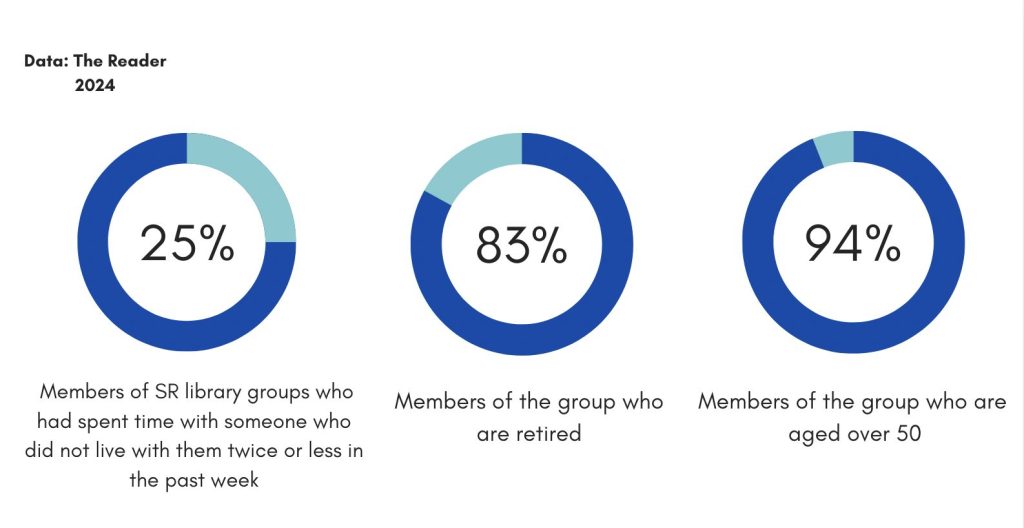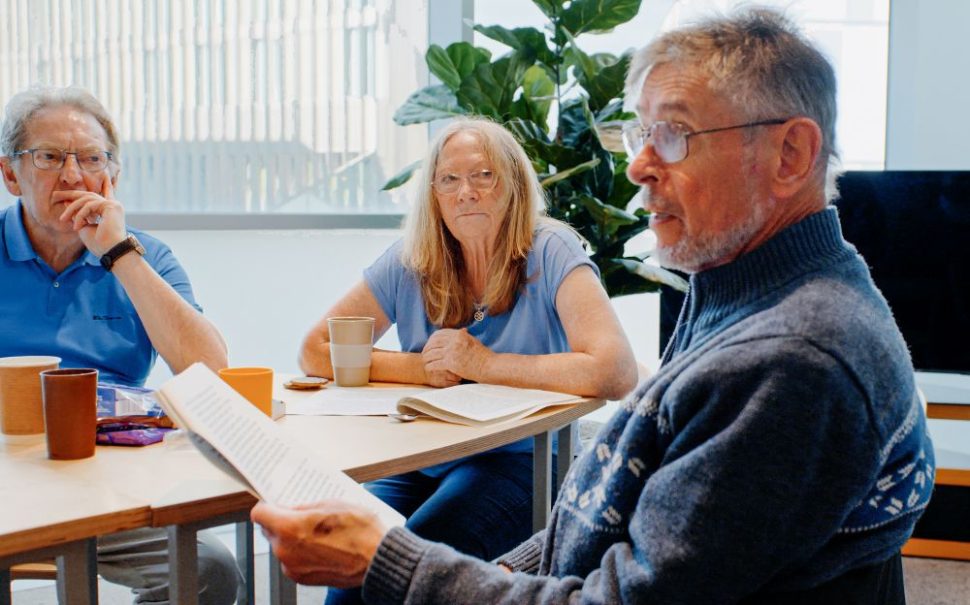The UK’s largest shared reading charity is working to combat loneliness affecting around 3.1 million people in England, according to 2023-24 ONS data.
With over 490 shared reading groups across the UK, including 112 in libraries, The Reader is fostering inclusive spaces where communities can come together to enjoy, read, and discuss literature, making meaningful social connections in the process.
This comes at a time where around four in ten people aged 70 and over reported they felt lonely often, always, some of the time or occasionally (40%), and 43% of those aged between 50 to 69 felt the same way (ONS).
Key demographics making up reading groups in 2024 included a high percentage of those aged 50 and above (94%), and nearly four-fifths of group members were retired (83%).
A quarter of members in shared reading groups in libraries had only spent time with someone who did not live with them, once or twice within the past week, reinforcing the community and social impact of reading groups.

Moreover, in the Spring 2024, The Reader carried out a full evaluation exercise, sharing surveys with all group members attending a shared seading group in its most extensive evaluation since the Covid-19 pandemic.
Participants in London made up nearly half of the responses (40%) which came from group members taking part in Unwin-funded library shared reading groups.
The research revealed over three-quarters of reading group attendees (78%) agreed the sessions helped them connect with others more deeply.
Furthermore, 88% of participants said they experienced a sense of shared achievement at the end of each session, and 85% reported feeling a stronger sense of belonging to their community.
Every week, individuals can attend a shared reading group, where a trained reader leader reads aloud from a novel, short story, poem, or other literary text.
Participants also have the opportunity to read aloud from the text and are then encouraged to engage with one another about the material they have read, picking out lines and phrases that especially resonate or interest them.
The Reader’s head of literary content Frances Macmillan highlighted the key aims of these groups includes fostering connections between attendees, and helping them find purpose and meaning through literature.
She said: “What is special about books and stories is that they can help us sort of make sense of life and so all of that stuff that we’re holding inside of ourselves.
“It is about getting that out, sharing it with other people and hopefully making people feel more connected and better through that process.”
Shared Reading groups have also had a profound impact on attendees’ emotional and mental health.
Nearly all reading group participants (97%) reported feeling valued, while 95% said the groups lifted their mood in a survey conducted by The Reader.
Moreover, 95% of attendees mentioned shifting perspectives during sessions, and 88% found they were able to put daily concerns aside.
Several shared reading groups in London specifically support individuals who speak English as a second language.
Macmillan emphasised the flexibility of these groups, which she remarked, aim to provide a familiar and welcoming environment.
She said: “It’s just about listening.
“You don’t even have to speak, you can just turn up and listen every week.”
These sessions have proven invaluable for individuals facing language barriers, offering both functional language skills and a safe space to express emotions.
One participant from south London said: “Loneliness, language barrier, and cultural shock are what new immigrants might come across in a new country.
“Joining [this group], where you can meet local people, make friends, learn the language as well as history, culture, practice, and way of thinking, will help you settle down and start a new life.
“I have recommended [the] reading group to my friends from Hong Kong.”
A north London library reported that its Shared Reading group inspired the Library Service to create similar initiatives to encourage social inclusion, learning, and community engagement.
One participant noted the group’s non-judgmental atmosphere, where everyone’s opinions were valued.
They added: “I always leave happy knowing that each member’s opinions matter.”
Macmillan underscored the unique experience these groups offer.
She said: “You can just go and sort of listen and experience the literature that’s actually sort of inside all those books lined up on the shelves as a live and participatory thing, and that gives you a reason to go to the library.”
Despite the proven benefits, barriers to accessing shared reading groups remain, including a limited awareness of their availability and locations.
Jonathan Holmes, 72, expressed surprise at learning about the group at his local south west London library.
Holmes said: “I didn’t know my library did events like this but I love reading and discussing the literature I read with others, so this is something I definitely will look into.”
Macmillan added: “We are just really trying to get that message out there that it’s free, it’s for everybody, and it can really make a difference.”
In addition to libraries, The Reader runs shared reading groups in a variety of settings, including cathedrals, cafes, care homes, and hospitals.
The charity has also worked with the criminal justice system for over two decades, engaging with category A to C prisons and probation settings.
Kate Bramhall, who recently led sessions in these settings, spoke with Macmillan on The Reader podcast, about their impact.
Reflecting on this and The Reader’s work in prisons and the probation system, Macmillan said: “Bringing literature into the criminal justice setting and the shared reading environment helped prisoners have a language for their experiences.
“Given that a large percentage of the prison population has a reading age below 11, that is hugely important and empowering.”
Macmillan addedd: “We’re really about trying to bring this thing that we know works and know that helps people to anyone who needs it.”
For more information and to find a nearby group, visit The Reader’s website.





